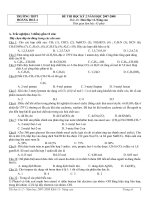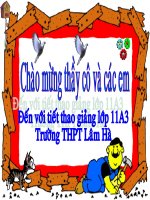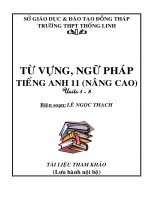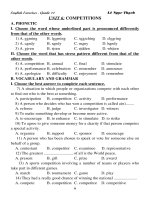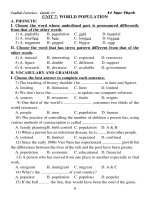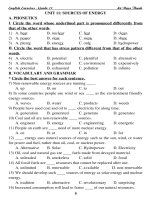11 NC -Unit 1
Bạn đang xem bản rút gọn của tài liệu. Xem và tải ngay bản đầy đủ của tài liệu tại đây (81.02 KB, 3 trang )
LESSON PLAN
Unit one Friendship
Lesson N
0
1-2 Reading
Outcomes
-By the end of the lesson, the students are able to scan reading for specific
information.
-By the end of the lesson, the students are able to skim reading for general ideas.
-By the end of the lesson, the students are able to express their ideas about friendship.
Type of lesson -Skill-based (Reading)
Key vocubulary
-confide in -through thick and thin -gurantee -stick
-evolve -break out into tears -detention -cheat
Key structures
-A good friend is a person who helps you do homework.
-A good friend always stands beside you even though you are a loser.
Anticipated
problem
-Some students may not be very willing to share ideas.
Materials
-Text book -Pictures / Drawings
-Chalk & board -Handouts
Stage/
Timing
Procedure Aims Focus Materials
1.Warmup
& lead-in
(10-12’)
2.Pre-
reading
(8-10’)
Games: Treasure Hunt
-Divide the class into two groups.
-Stick 6 pictures of things (or draw the things) on the
board.
-Tell SS to find out the treasure, the word of the day
by combining the first letters in the names of these
things. (Do not give them the names.)
-The first group to find it will win the game.
-Check SS’ understanding of instructions.
-Give an example like this: a picture of a Car, of an
Apple, and of a Tree, the word in this case is “CAT”.
-Have SS start the game.
-These are the pictures: → the word of the day is
“FRIEND”
Flower – Ring – Ice-cream – Eye – Nurse – Dog
-Declare the winner.
-Ask SS:
-Do you have a friends?
-What is a good friend like, according to you?
-Note down some key points.
Transition: -In today’s reading, we’ll get to know more
about the friends and friendship.
-Write down on the board: Unit 1 Friendship
Teaching Vocabulary
-Elicit meanings from SS or give explanations
yourself.
-To raise
SS’ interest
and to lead
to the topic
-To engage
SS, and let
SS’ express
their
opinions
-To provide
SS’s with
some
language to
Groups
T-class
T-class
T-class
T-class
-Pictures or
Drawings
-Chalk and
board
-Chalk and
board
-Chalk and
board
(5-6’)
3.While-
reading
(10-15’)
(15-18’)
.break out into tears (v.) = begin to cry
.through thick and thin (idm) = inspite of all the
difficulties (trong bất cứ hoàn cảnh nào)
.cheat (v.) = act dishonestly; copy sb’s work in a test
.detention (n.) = punishment of being kept at school
after it has closed (hình phạt giam ở trường sau giờ
học)
.cofide in sb (v.) = trust sb enough to tell a secret to
him/her
.guarantee (n.) = sự đảm bảo
.evolve (v.) = develop naturally and gradually
.stick together (v.) = remain friendly and loyal to one
another (gắn bó)
-Give some practice on pronunciation. (Read – SS
repeat)
Checking Vocabulary: Gap-filling
-Give SS handouts and ask them to work in pairs,
completing the sentences, using the words just
learned.
1. A good friend remains loyal to you _______.
2.Blue skies are not a _________ of continuing fine
weather.
3.Being scolded by his mother, the child _____
_____.
4.Those students were sent to the __________ room
for their cheating on the exam.
5.Like friendship, trust ___________ with time.
6.Ann thinks there’s no one in the class she can
___________.
-Check with the class.
Expected answers:
1.through thick and thin 2.gurantee
3.broke out into tears 4.detention
5.evolves 6.confide in
Activity 1: Reading and Matching (Task a, p.16)
-Ask SS to read Text A and then match the grades
with John’s opinions on what a good friend is.
-Call on SS to say what John thought of a good friend
in each grade.
-Go over the answers with the class.
Activity 2: True - False Statements (Task b, p.16)
-Ask SS to read the statements about close friends in
Task b (p.16) and say if they are true or false, i.e. SS
agree or disargree with them.
-Check with the class and note down on the board
SS’ opinions.
-Tell SS to read Text B and decide if the statements
are true or false.
-Ask SS to work with a partner and compare
answers.
-Call over SS to read the statements and say their
choice.
-Go over the answers with the class.
-Tell SS to compare the ideas in the text and SS’
opinions.
Answers: 1.T 2.F (According to the text,
help them
understand
the text
-To help
enrich SS
knowledge
of vocab
-To see if
SS have
learned the
words and
know how
to use them
in a new
context
-To develop
SS’s
skimming
skills
-To give
some
personal-
ised task to
engage SS
-To provide
some
pratice on
scanning
skill
T-class
Pairs
Indivi-
duals
T-class
Indivi-
duals
Pairs
T-class
-Handouts
-Textbook
-Textbook
-Chalk and
board
(10-12’)
4.Post-
reading
(14-16’)
5.Home-
work (1’)
we become friends with those who share common
interests.) 3.F (We cannot go out and pick a
good friend) 4.T 5.T
Activity 3: Main ideas
-Write down on the board three phrases about the
main ideas of the paragraphs in Text B and one extra
phrase.
a.possible reasons for not having a best friend
b.what to do to have a best friend
c.how best friendship develops
d.the benefits of a best friend/ what a best friend
can do to us
-Ask SS to skim the text again and match the
paragraphs with their suitable main ideas.
-When they have finished, tell SS to compare
answers with a partner.
-Go over the answers with the class.
Expected answers:
Par.1 – d Par.2 – c Par.3 – a
Dicussion
-Ask SS to work in groups of 4 or 5, expressing their
opinions on the following questions:
a.Close friends don’t need to share common
interests. Argree or disargree? Give reasons.
b.What is your own ideas of a good friend?
c. How do you understand the proverb “A friend in
need is a friend indeed”?
-Go around to control and give help if necessary.
-Call SS to report about their group’s ideas.
-Give the feedback and comments on what SS have.
Writing: Sentence Building
-Give Ss handouts, and ask them to make sentences
using the cues.
1.your friend/ good friend/ different/ different
grades.
2.best friend/ someone/ you can confide.
3.best friends/ usually stick together/ thick/ thin.
4.best friend/ help you/ avoid/ depression/ anxiety.
Expected answers:
1.Your ideas of a good friend are different in
different grades.
2. A best friend is someone you can confide in.
3. Best friends usually stick together through thick
an thin.
4. A best friend can help you avoid depression and
anxiety.
-To provide
practise on
skimming
for general
ideas
-For SS to
share and
learn
-To provide
SS with
some free
practice
and to have
them
express
themselves
and share
ideas
-To give
more
practice at
home about
the content
of the text
Indivi-
duals
Pairs
Groups
SS-SS
T-class
Indivi-
duals
-Textbook
-Chalk and
board
-Chalk and
board
-Chalk and
board
-Handouts
